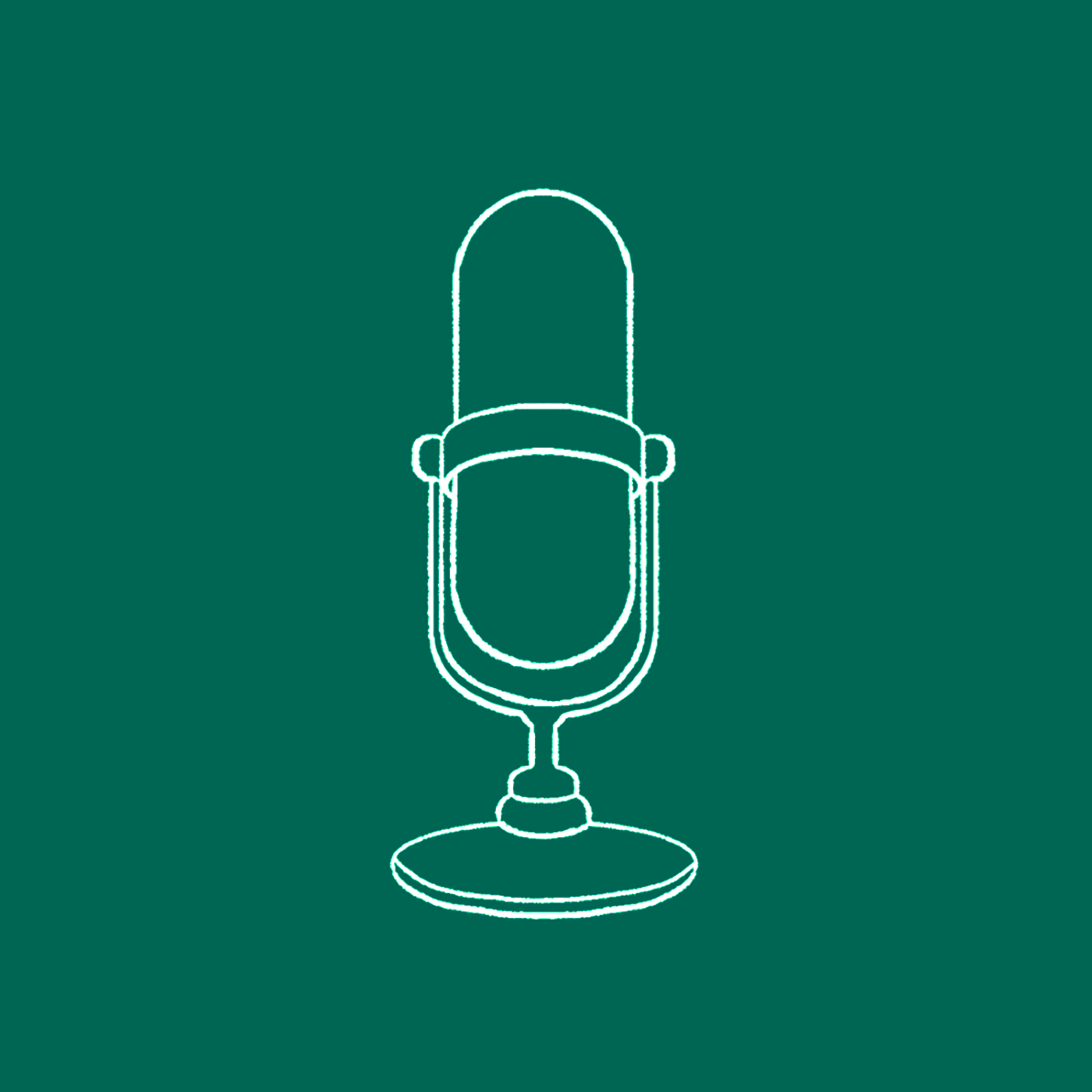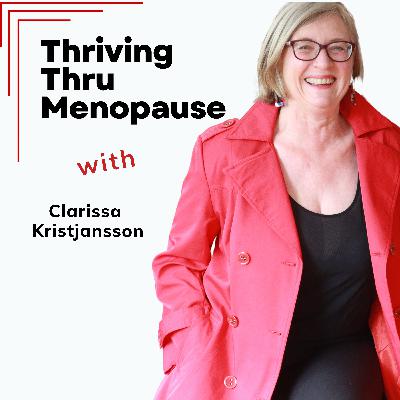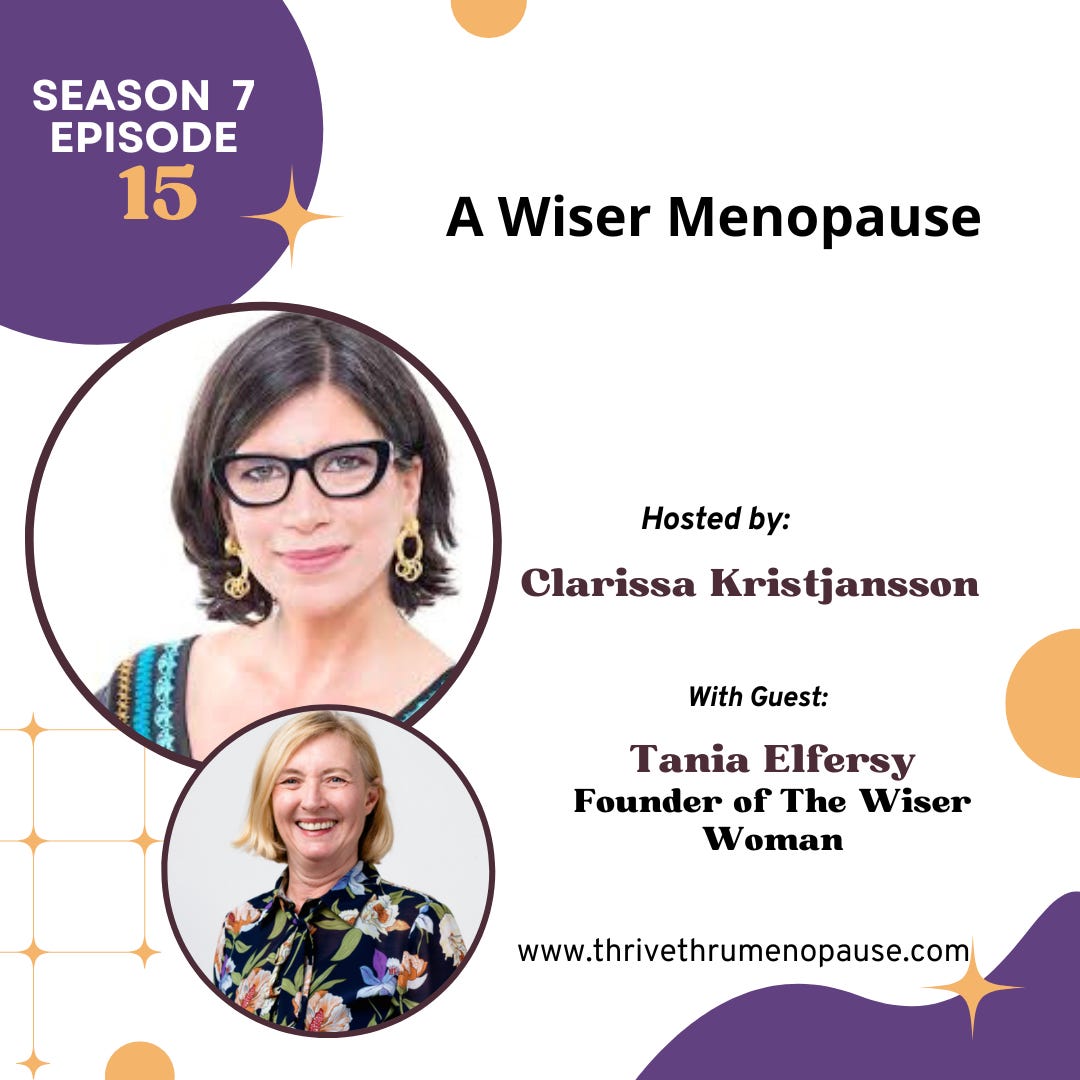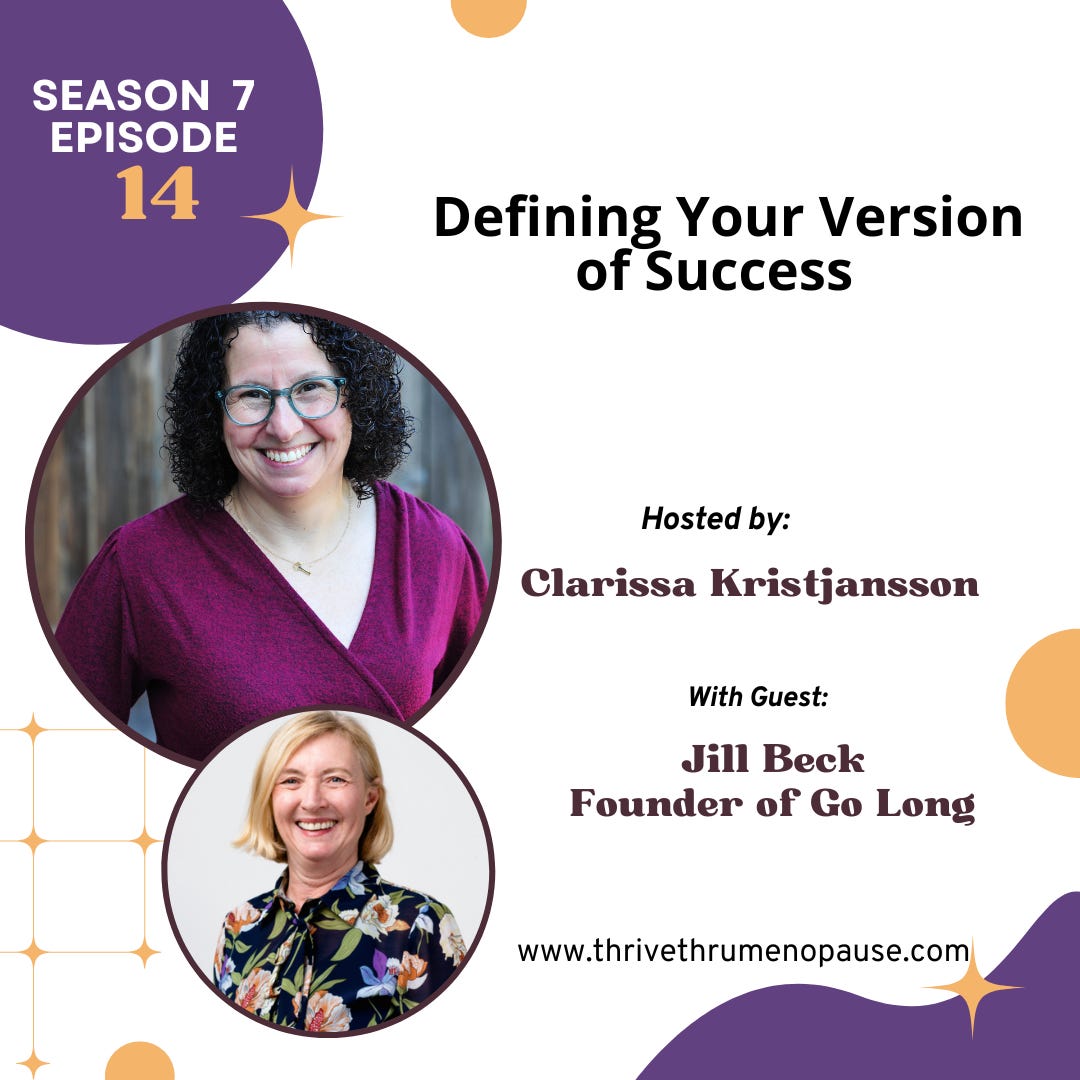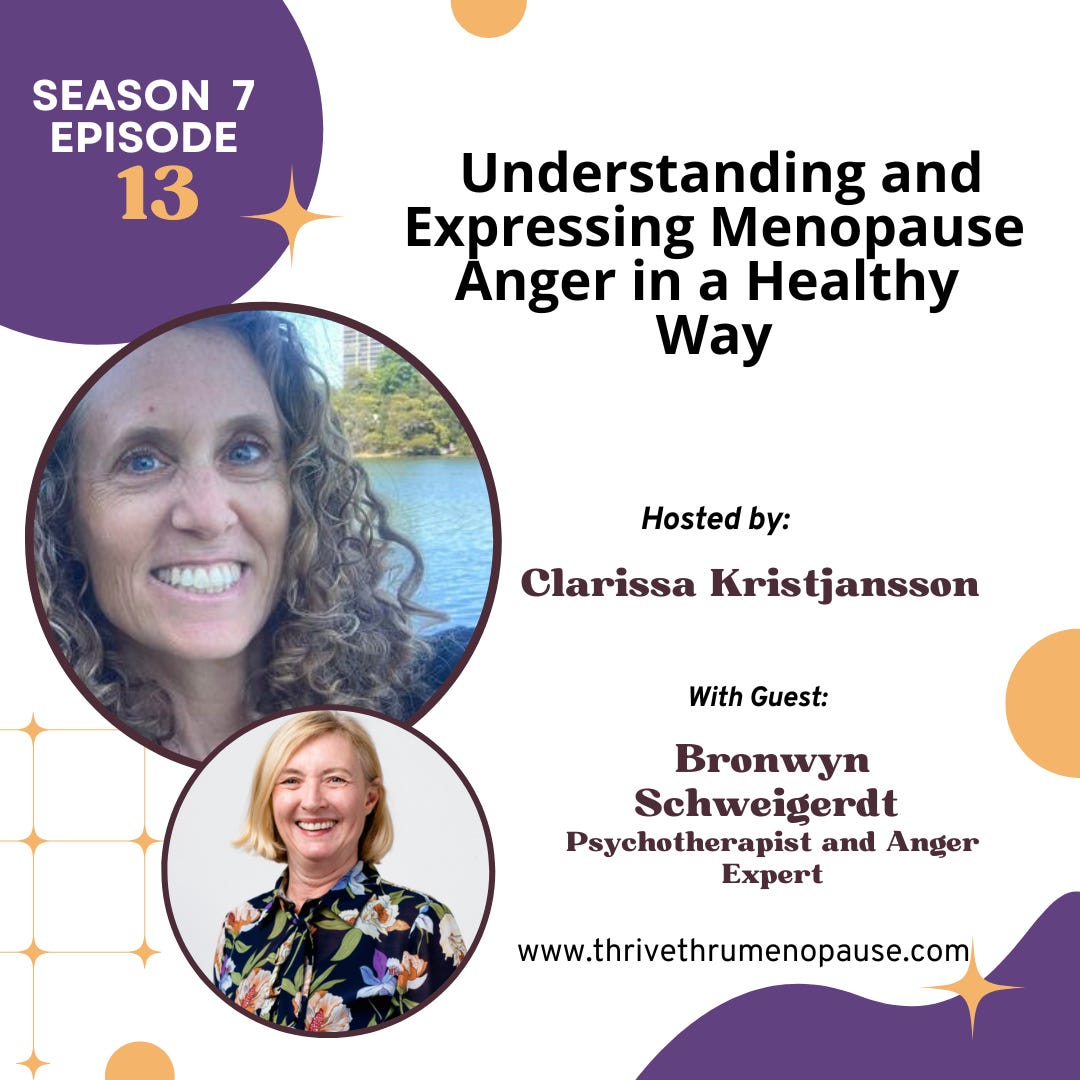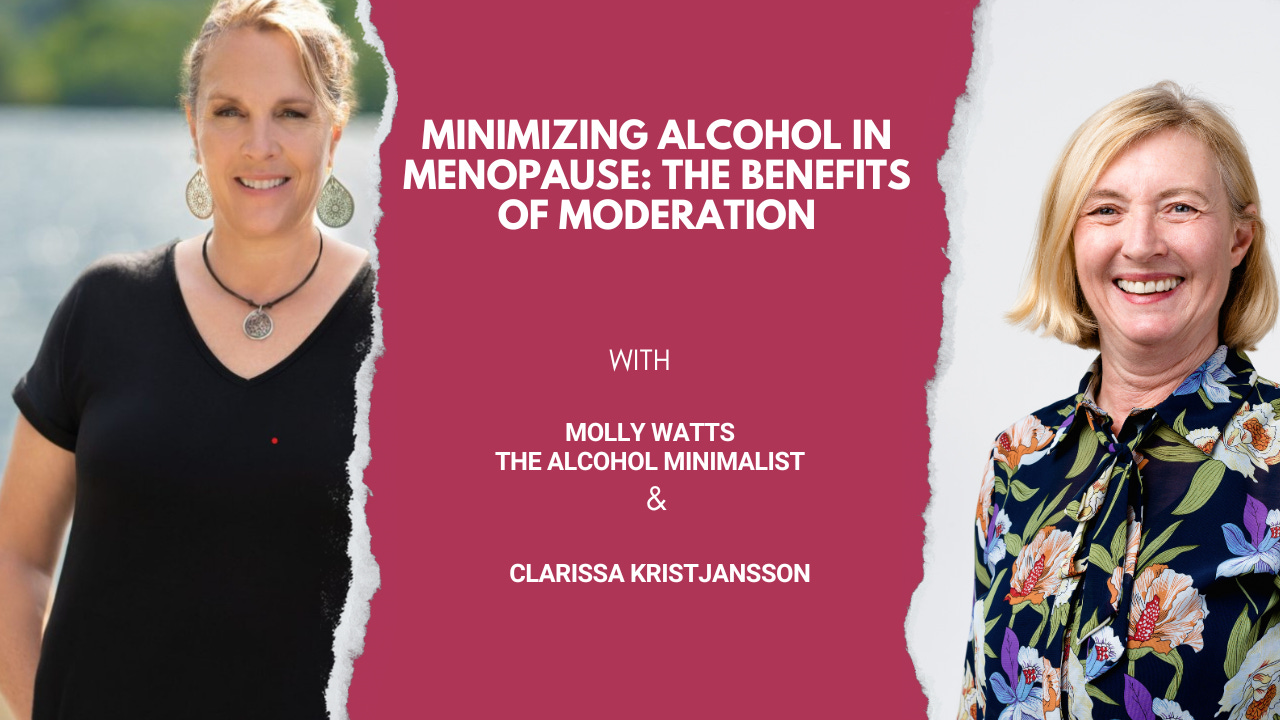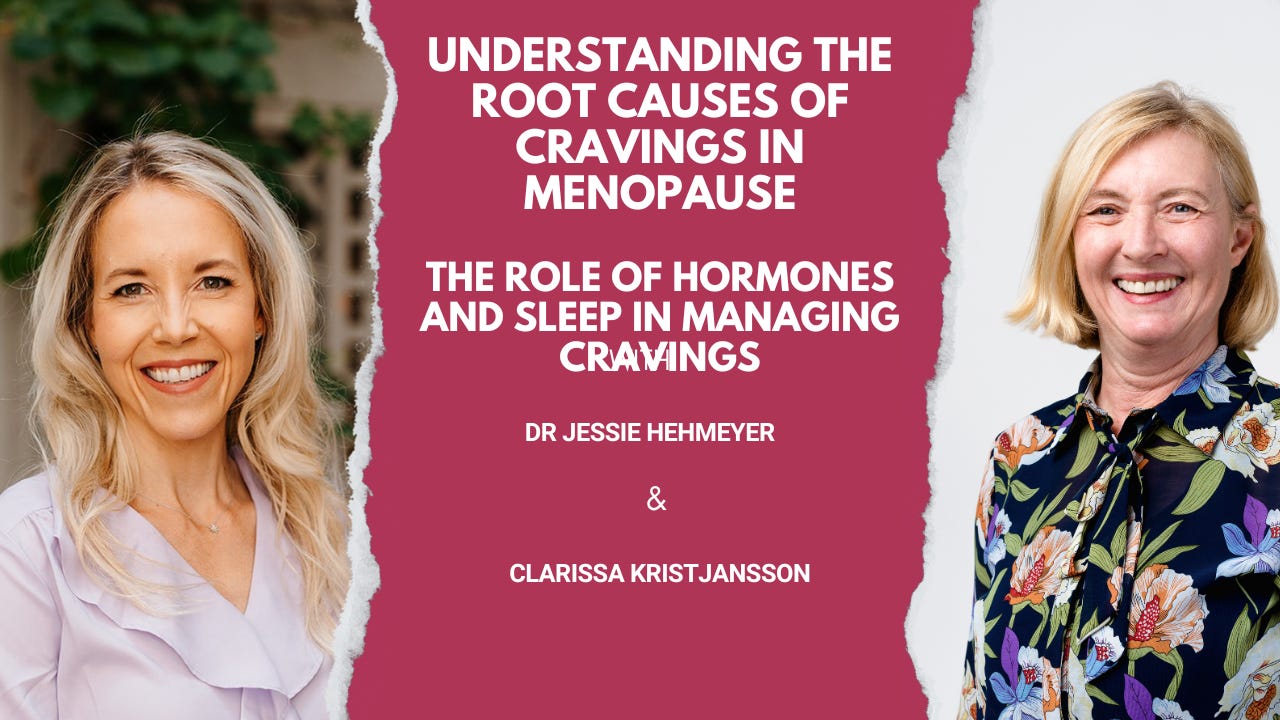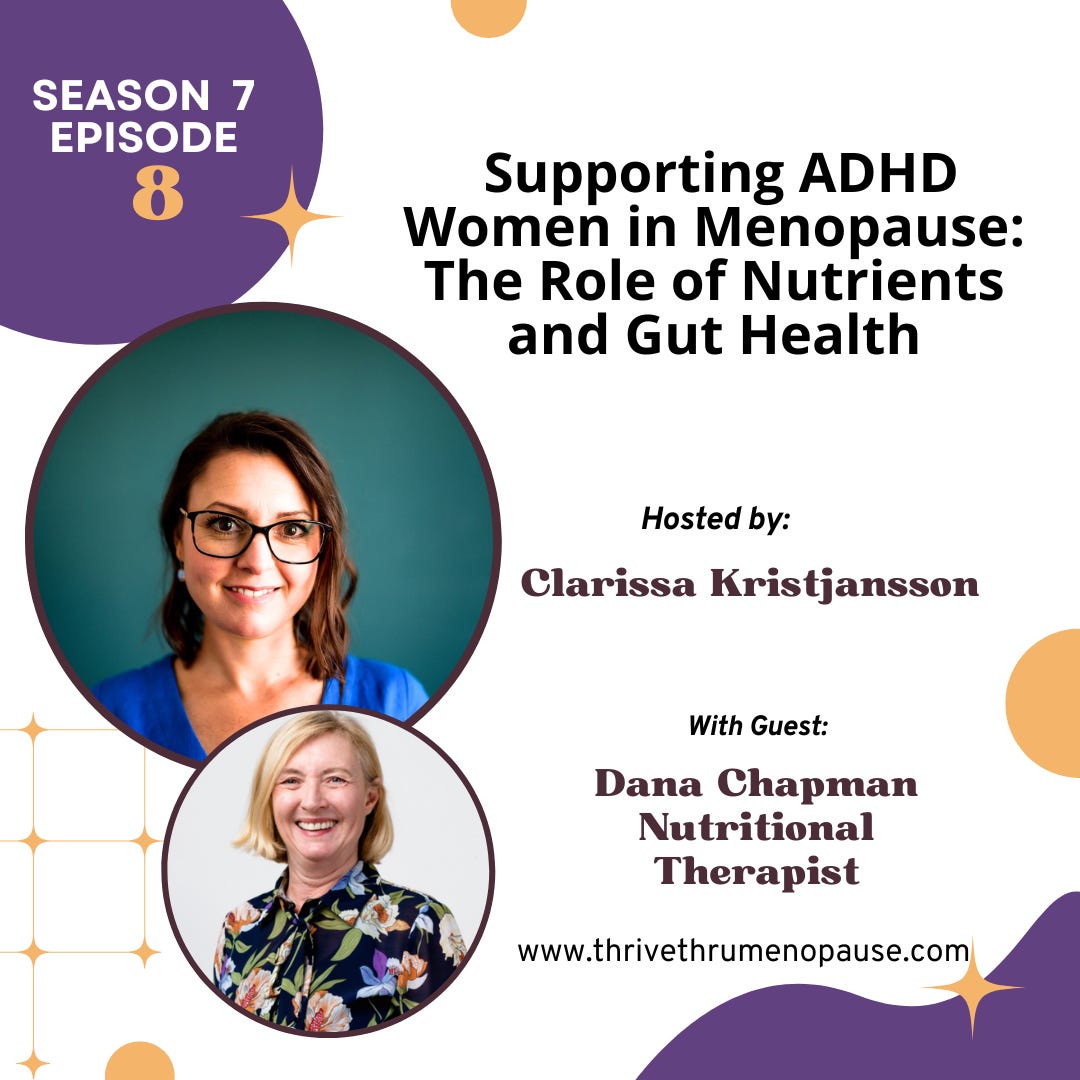Discover Heart of Menopause
Heart of Menopause

Heart of Menopause
Author: Clarissa Kristjansson
Subscribed: 147Played: 1,762Subscribe
Share
© Clarissa Kristjansson
Description
Traditional Chinese Medicine practitioner specializing in Women’s Health, specifically peri through to post menopausal health. Menopause is a journey, not a disease.
clarissakristjansson.substack.com
clarissakristjansson.substack.com
243 Episodes
Reverse
In this week’s LIVE, we discussed how both Ayurveda and TCM (traditional Chinese Medicine) recognize the dual nature of beverages like alcohol and coffee. While they can be beneficial, they can also create imbalances in the mind, body, and spirit if over-consumed. The key is understanding your body's needs and the context in which you consume these beverages.Episode Timeline: Navigating Menopause with Traditional Wisdom0:00 - 2:00 - Introduction: Welcome and overview of the episode's focus on traditional wisdom in menopause. 2:01 - 5:00 - Host Introductions: Meet Chitra and Clarissa, experts in Ayurveda and Chinese Medicine. 5:01 - 15:00 - The Role of Context: Understanding individual constitution, environment, and season in health practices. 15:01 - 25:00 - Alcohol and Coffee: Exploring the dual nature of these beverages and their impact on women’s menopause experiences 25:01 - 35:00 - Seasonal Living: Tips for aligning lifestyle with natural rhythms for enhanced well-being. 40:01 - 45:00 - Conclusion: Recap of key takeaways and closing thoughts. If you have any questions or comments from your own experiences, then do reach out to me or Chitra.If you've enjoyed and found value in our offerings, subscribe now to discover how traditional practices can enrich your modern lifestyle. Get full access to Heart of Menopause at clarissakristjansson.substack.com/subscribe
As the summer vacations kick into full swing in the Northern hemisphereJoin Chitra Eder and me for a rich conversation as we explore essential strategies for supporting women through perimenopause and menopause, especially during the vibrant, and sometimes overwhelming, summer season.We dive into the concept of the "Second Spring" and the intrinsic connections between seasonal transitions.The impact of summer heat on us, and take a closer look at the effects of alcohol, dairy, and other common summer indulgences, and share holistic tools for maintaining balance while traveling and on post-vacation adjustments, offering practical advice for easing back into regular routines.Whether you're soaking up the sun or enjoying a city break, this episode is filled with insight, warmth, and supportive practices to help you get the most from this time away from the daily routine.00:00 Introduction to the Art and Heart of Menopause02:31 Summer Celebrations and Their Impact on Health03:33 Navigating Summer Vacations: Cultural Perspectives07:24 The Ayurvedic and Chinese Medicine Approach to Summer10:09 Cooling Foods and Their Benefits 13:37 Alcohol and Its Effects on the Body16:47 Healthy Eating Habits During Summer30:23 Travel Tips for Maintaining Balance32:31 In-Flight Tips for Better Digestion34:23 Chinese Medicine Practices for Travel37:26 Managing Vata and Constipation During Flights38:42 Post-Flight Rest and Recovery40:15 Ayurvedic Tips for Different Doshas on Vacation47:16 Adjusting Back to Routine After Vacation50:42 Hydration and Diet Tips for Returning Home59:37 Upcoming Workshops and Final Thoughts Share with friendsIf you enjoy Art of Menopausing, share it with women in your network. Get full access to Heart of Menopause at clarissakristjansson.substack.com/subscribe
This episode Chitra Eder and I dived deep into the Whole Body Medicine approach and how it is covered within Ayurveda and TCM.Some of our key talking points in this live included* What do we mean by the Whole Body Approach in Ayurveda and Traditional Chinese Medicine?* How Western medicine has witnessed the rise of 'heroic' medicine that is very focused on tests, symptoms, and fixing problems, and how that leads to a narrow definition of health* Is holistic medicine truly holistic? * How do Chitra and I work with patients and clients to bring whole person support, aka the questions we ask, the diagnosis types..* Our wishes for the future and how to marry the best of allopathic and whole person medicineWe would love to hear your comments and questions.Join us next week LIVE for a discussion on a practitioner’s guide to summer travel and vacations. Get full access to Heart of Menopause at clarissakristjansson.substack.com/subscribe
This week, Chitra Eder and I discussed how massage is perceived in Ayurveda and TCM, different massage practices, and benefits for women in perimenopause and menopause.If you are interested in learning more about how these traditional forms of medicine can support your menopause journey, then join us live every Thursday for more conversations.Do check out Chitra’s upcoming Ayurvedic Solstice Workshop happening this Saturday.Stay tuned for more information on my upcoming Rebalance & Restore: Menopause Support Through the Combination of Traditional Chinese Medicine & Essential Oils Get full access to Heart of Menopause at clarissakristjansson.substack.com/subscribe
In this episode, Chitra Eder and I explore one of the most powerful yet often overlooked keys to well-being during perimenopause and menopause: the natural daily clock.Both Ayurveda and Traditional Chinese Medicine mapped out daily rhythms based on the flow of energy through the body and the world around us. Long before modern science spoke of circadian rhythms, these traditions understood how time, energy, and health are intimately connected.But in today’s world, shaped by productivity culture, artificial light, and constant demands, we’ve lost touch with these natural cycles. The result? Exhaustion, poor sleep, erratic digestion, and emotional overwhelm that so many of us experience in midlife.In this episode, we discuss:* The Ayurvedic and TCM daily clocks what they are, how they differ, and where they beautifully align.* The impact of modern life and patriarchal systems on our natural rhythms.* How menopausal symptoms intensify when we’re out of sync with biological time.* Simple, doable steps to reconnect with nature’s flow, including meal timing, rest, and honoring your energy.You’ll come away with fresh insights and practical tips to help you live more in tune with your body’s natural intelligence, even in a fast-paced world. This is about listening, aligning, and gently reclaiming your rhythm.So here’s a question we invite you to reflect on as you listen:What do you struggle with most when trying to harmonize your day with your natural daily clock? Get full access to Heart of Menopause at clarissakristjansson.substack.com/subscribe
Welcome to the second episode in our LIVE series exploring ancient wisdom for a modern menopause.In this conversation, Chitra Eder and I turn our attention to the seasonal shift toward summer, a time that’s naturally hotter and drier. For those of us in perimenopause, who may already be experiencing heat and dryness, this seasonal transition can intensify our symptoms and leave us feeling even more out of balance.However, the wisdom of ancient medicine provides powerful tools to help us navigate this shift with greater ease. In this episode, we explore how changes in the way we eat, cook, and live can bring cooling, soothing support to the body, without tipping us into coldness or depletion.Join us as we explore how to reconnect with nature’s rhythms and discover how to work with the seasons, not against them, for a more grounded and nourishing menopausal journey. Get full access to Heart of Menopause at clarissakristjansson.substack.com/subscribe
Thank you to everyone who tuned in to our first live!If you missed it, here is me talking about ancient wisdom around the menopause transition. And why it is important for every woman to recognise that every step on our journey is an opportunity to prepare ourselves to meet this life stage with greater ease. Join us for the next live video in the app next Thursday at 11.00 am EST Get full access to Heart of Menopause at clarissakristjansson.substack.com/subscribe
Join me for my next live video in the app This is a public episode. If you would like to discuss this with other subscribers or get access to bonus episodes, visit clarissakristjansson.substack.com
Join me in a powerful short breathwork practice that strengths the Qi (energy), Shen (spirit) and Jing (essence) and strengthens our Wei Qi field so that we have stronger energetic boundaries This is a public episode. If you would like to discuss this with other subscribers or get access to bonus episodes, visit clarissakristjansson.substack.com
Join me for my next live video in the app This is a public episode. If you would like to discuss this with other subscribers or get access to bonus episodes, visit clarissakristjansson.substack.com
Join me for my next live video in the app This is a public episode. If you would like to discuss this with other subscribers or get access to bonus episodes, visit clarissakristjansson.substack.com
In this final episode ever of the podcast in an enlightening conversation, Clarissa and Tania Elfersy, educator, certified transformative coach, author, and creator of The Wiser Woman, delve into the evolving discourse surrounding menopause, exploring its historical context, the impact of misinformation, and the importance of restoring trust in one's body. They challenge the prevalent narratives that frame menopause as a deficiency and discuss how women can navigate this life transition as a rite of passage, embracing the wisdom and empowerment that comes with it.Takeaways* The conversation around menopause has evolved significantly in recent years.* Historical studies have shaped the current understanding of HRT and its implications.* Fear and misinformation have created a negative narrative around menopause.* Menopause should not be viewed as a deficiency but as a natural transition.* Trusting the body is essential for navigating menopause healthily.* Lifestyle factors play a crucial role in managing menopause symptoms.* Societal narratives often mislead women about aging and health.* Menopause can be seen as a rite of passage, leading to greater wisdom and empowerment.* The importance of community and support during this transition cannot be overstated.* Women can reclaim their health by focusing on holistic well-being rather than solely on medication.Chapters00:00 Introduction and Guest Introduction01:52 The Shift in the Menopause Space Since 201705:30 Negative Messaging and Fear around Menopause10:37 Misleading Messages about HRT and Disease Prevention12:28 Divisive Messages: Menopause as a Deficiency and Trigger of Disease18:56 Restoring Trust in the Body and Understanding Symptoms22:43 Navigating the Shock of Perimenopause and Coming Off Medications23:31 The Body's Intelligence and Recovery24:23 Understanding Menopause as a Natural Transition26:39 Listening to the Body and Making Lifestyle Changes28:27The Influence of Societal Messaging and the Menopause Industry31:40 Embracing Menopause as a Rite of Passage34:12 Trusting the Body and Creating a Joy-Filled LifeConnect with Tania https://www.thewiserwoman.com/Follow her on Facebook https://www.facebook.com/TheWiserWoman/ and X https://x.com/TheWiserWoman Get your copy of Beyond Hormones: 7 Holistic Ways to Thrive Through Menopause available at Barnes and Noble https://bit.ly/3WCSNbn and on Amazon https://bit.ly/BeyondHormones This is a public episode. If you would like to discuss this with other subscribers or get access to bonus episodes, visit clarissakristjansson.substack.com
In this penultimate episode of Thriving Thru Menopause, host Clarissa talks with Jill Beck, a burnout coach who helps women navigate the stresses of midlife and menopause. Jil is a 2x co-founder, angel investor, consultant, connector, team leader, former finance and tech executive, and problem solver. She is also someone who manages 3 different autoimmune diseases and is stronger than ever.Jill shares her own journey of being diagnosed with autoimmune diseases and leaving the corporate world. She emphasizes the importance of self-care and preventing burnout, and encourages women to prioritize their own well-being. Jill also discusses the challenges women face in male-dominated workplaces and the need for more empathy and support. She advises women to define their own version of success and focus on the possibilities of creating a better life.Takeaways* Women in midlife often face increased stress and burnout, and it is important to prioritize self-care and well-being.* The corporate world can be challenging for women, especially in male-dominated environments, and it is crucial to find support and empathy.* Defining your own version of success is important, and it is essential to focus on the possibilities and opportunities in life.* Taking small steps and breaking tasks down can help manage overwhelm and create positive change.* Being mindful of supplements and seeking credible sources of information can help make informed decisions about health and well-being.Chapters00:00 Introduction and the Stresses of Midlife11:26 Challenges for Midlife Women in the Corporate World24:53 Burnout and Overwhelm in Midlife36:12 Defining Success and Creating PossibilitiesConnect with Jillhttps://golong.me IG/Threads: @justgolong This is a public episode. If you would like to discuss this with other subscribers or get access to bonus episodes, visit clarissakristjansson.substack.com
In this episode, Clarissa sits down with psychotherapist Bronwyn Schweigerdt for a powerful discussion on anger, particularly in the context of menopause. Together, they dive deep into the societal stigma surrounding anger—especially for women—and how it’s often suppressed or labeled as unacceptable. Bronwyn sheds light on why acknowledging and expressing anger in a healthy way is crucial, as bottled-up anger can wreak havoc on both mental and physical health. They challenge the limitations of traditional anger management techniques and cognitive behavioral therapy (CBT), arguing that these methods often fail to address the deeper roots of anger. Instead, Bronwyn emphasizes the importance of understanding patterns of behavior, interpersonal relationships, and past trauma that shape our anger. This conversation also uncovers how shame plays a major role in keeping anger suppressed, and Bronwyn offers an eye-opening exercise to help unlearn this shame. She highlights the importance of vulnerability and authenticity in truly addressing anger, urging women to be true to themselves and not let their anger turn inward or outward in harmful ways. If you’re navigating menopause and the complex emotions that come with it, this episode is a must-watch. TAKEAWAYS * Anger is a natural emotion that should be acknowledged and expressed in a healthy way. * Societal stigma, particularly for women, often leads to the suppression of anger. Repressed anger can manifest as mental and physical health issues. * Traditional anger management techniques and cognitive behavioral therapy (CBT) may only address the symptoms of anger, not the root causes. * Anger is often rooted in interpersonal relationships and past trauma. A holistic approach is needed to heal and manage anger. * Shame plays a significant role in repressing anger and can lead to disintegration and compartmentalization of emotions. Unlearning shame is possible through exercises that involve recognizing the source of shame and returning it to the person responsible. * Being true to oneself and taking responsibility for one's own feelings is essential in addressing and managing anger. * Women need to address their anger and not turn it inward or outward in harmful ways, and this requires vulnerability and authenticity. Connect with Bronwyn Website https://angryattherightthings.com/ Podcast https://angryattherightthings.podbean.com/ Grab a copy of Clarissa's new book Beyond Hormones on Amazon https://bit.ly/BeyondHormones or Barnes and Noble https://bit.ly/3WCSNbn This is a public episode. If you would like to discuss this with other subscribers or get access to bonus episodes, visit clarissakristjansson.substack.com
My guest this week is author, speaker, and renowned women’s health expert DR. LIZ LYSTER. As an OB/GYN and the founder of The Miracle of Menopause women’s network, Dr. Liz is a vocal advocate for women’s health and offers personalized guidance and comprehensive wellness strategies designed to help women navigate hormonal change and reclaim their well-being.We delve into the often misunderstood phases of perimenopause and menopause and uncover the nuances and complexities of these significant life stages, offering a fresh perspective on how women can navigate the physical and emotional challenges they bring. Understanding the Differences Dr. Liz begins by clarifying the distinctions between perimenopause and menopause, shedding light on the journey that starts with perimenopause—a transitional phase marked by hormonal fluctuations that can last several years before menopause officially begins. They debunk the common myth that as long as a woman is still menstruating, she doesn’t experience hormonal issues, emphasizing that symptoms can start long before periods cease.The Physical and Emotional Rollercoaster The conversation takes a deep dive into the array of symptoms women may experience, from sleep disruptions and weight gain to mood changes and the emotional toll these changes can bring. Dr. Liz highlights the importance of acknowledging these challenges as valid and impactful, encouraging listeners to approach them with empathy and understanding. A Holistic Approach to Symptom Management Dr. Liz passionately advocates for a holistic approach to managing perimenopause and menopause symptoms. She emphasizes the necessity of addressing the root causes of hormonal imbalances rather than merely treating symptoms. Lifestyle factors such as diet, exercise, and stress management emerge as crucial components of this approach, offering women a path to regain control over their health and well-being. The Role of Growth Hormone and Restorative Practices In a fascinating segment, the discussion explores the role of growth hormone in women's health during these phases. Dr. Liz explains how growth hormone can support vitality and well-being, and they explore how restorative practices, such as mindful breaks in exercise and the benefits of walking or brisk walking, can significantly enhance overall health. Challenges Within the Western Medical System Clarissa and Dr. Liz candidly address the limitations of the Western medical system in adequately supporting women through perimenopause and menopause. They advocate for more individualized treatment approaches, recognizing that each woman's experience is unique and requires tailored strategies for effective symptom management. The Power of Community and Support The episode underscores the importance of community and support networks in navigating this life stage. Dr. Liz shares inspiring stories of transformation and personal growth that can occur during menopause, highlighting this time as an opportunity for empowerment and self-discovery. This engaging discussion offers valuable insights and practical advice for women facing perimenopause and menopause, empowering them to embrace this transformative period with confidence and resilience. Whether you're at the beginning of this journey or supporting someone who is, this episode provides a comprehensive guide to understanding and thriving through perimenopause and menopause. Takeaways* Perimenopause is the period leading up to menopause and can last up to 10 years or longer.* Menopause is defined as one whole year without having a menstrual period.* Hormonal fluctuations during perimenopause and menopause can lead to sleep disruption, weight gain, mood changes, and other symptoms.* There are common misconceptions about perimenopause and menopause, such as the belief that if a woman is still having her period, she doesn't have hormonal issues.* A holistic approach that addresses lifestyle factors, such as diet, exercise, and stress management, is important in managing symptoms.* Finding the root cause of hormonal imbalances is crucial for effective treatment. Growth hormone is important for overall health and can be stimulated through exercise and restorative breaks.* Walking, especially fast walking, is beneficial for women during perimenopause and menopause.* The Western medical system often lacks time and support for women going through perimenopause and menopause, leading to a band-aid approach and reliance on pharmaceuticals.* Women need to advocate for themselves and seek out individualized treatment approaches.* Community and support networks are essential for women during this stage of life.* Menopause is an opportunity for transformation and personal growth.Connect with Dr Liz Lyster https://drlizmd.com/ Follow Dr Liz https://www.instagram.com/drlizlyster/ https://www.linkedin.com/in/drlizmd/ https://www.facebook.com/DrLizLyster Grab a copy of my new book Beyond Hormones: 7 Holistic Ways to Thrive Through Menopause available on Amazon https://bit.ly/BeyondHormones and Barnes and Noble https://bit.ly/3WCSNbn Get full access to Heart of Menopause at clarissakristjansson.substack.com/subscribe
In today’s episode, we’re diving deep into the world of sleep, especially for women navigating perimenopause and menopause. This week, Clarissa is in conversation with Joya Van Der Laan, a board-certified nurse practitioner and the founder of Nourish House Calls. Van Der Laan has specialized in Functional Medicine for over a decade and a key area of her work is supporting women to sleep better in perimenopause and menopause. They explore how sleep is interconnected with hormone balance, stress, and overall health. Joya emphasizes the need for quality sleep and suggests tracking sleep patterns using devices like the Oura Ring. They also discuss the role of nutrition, particularly in managing blood sugar levels, and how it can impact sleep. The conversation looks into the importance of our hormones in supporting better sleep, including managing stress hormones and the role and importance of progesterone in promoting better sleep and relaxation. It also explores the impact of estrogen on sleep quality.Throughout the conversation, Joya highlights the need to treat the whole person and consider the interconnectedness of various factors in improving sleep quality. How lifestyle factors such as exercise, alcohol, and strategies for managing the need to urinate during the night all play important roles in ensuring a good night’s sleep.Joya emphasizes the importance of a holistic approach to sleep, including hormone optimization, nutrition, and the role of supplements.She encourages listeners to advocate for themselves and seek solutions for better sleep.Takeaways* Sleep is a crucial aspect of overall health for women in perimenopause and menopause.* Tracking sleep patterns using devices like the Oura Ring or Whoop Strap can provide valuable insights into sleep quality.* Nutrition plays a significant role in sleep, particularly in managing blood sugar levels.* Managing stress is essential for better sleep, and practices like mindfulness and breathwork can help activate the parasympathetic nervous system.* Progesterone is a key hormone that promotes better sleep and helps balance cortisol levels. It is also important for sleep and relaxation as it is a precursor for GABA, a neurotransmitter that plays a role in sleep.* Treating the whole person and considering the interconnectedness of various factors is crucial in improving sleep quality. * The balance of estrogen can affect sleep, particularly its role in hot flashes, night sweats, and cortisol spikes.* Exercise should be approached with caution, as intense workouts can drain the adrenal bank account and disrupt sleep. Weightlifting and muscle-building exercises are beneficial for hormone balance and healthy aging.* Alcohol consumption can negatively impact sleep quality and overall health. It is important to be mindful of the effects of alcohol and make informed choices.* Proper hydration, including electrolyte balance, can help manage the need to urinate during the night. Pelvic floor health and vaginal tissue health are also important considerations.* Advocating for oneself and seeking solutions for better sleep is crucial, as sleep issues during menopause can be addressed and improved with the right approach. 🔗 Links & Resources: Follow Joya Van Der Laan: Nourish House Calls https://nourishhousecalls.com/ Grab a copy of Clarissa's new book Beyond Hormones: 7 Holistic Ways to Thrive Through Menopause https://bit.ly/BeyondHormones This is a public episode. If you would like to discuss this with other subscribers or get access to bonus episodes, visit clarissakristjansson.substack.com
Did you know that most of us can benefit from simply cutting back on alcohol without having to claim sobriety or be completely alcohol-free? In this episode of @thrivingthrumenopause , Clarissa is joined by the inspiring Molly Watts to delve into a crucial topic for women in midlife: alcohol and its impact during perimenopause and menopause. Molly is the host of the top-rated Alcohol Minimalist podcast. She is a trusted voice in the mindful drinking community, an expert contributor to Sunnyside (a mindful drinking app), and Moderation Management,that provides support for anyone who wants to change their relationship with alcohol.In our conversation, Molly shares her personal journey, revealing how she transformed her relationship with alcohol. They uncover the science behind alcohol consumption, discussing the specific risks it poses for women in this stage of life. Molly emphasizes the importance of mindfulness and intentionality when it comes to drinking, offering actionable tips for embracing alcohol minimalism. Together, they challenge societal norms and beliefs surrounding alcohol, shedding light on the often overlooked benefits of prioritizing alcohol-free days. This engaging conversation is a must-listen for women aged 40 to 60. It aims to empower you with knowledge and practical strategies to navigate midlife with health and confidence. Don't miss out on these valuable insights, which could transform your approach to alcohol and enhance your overall well-being as you navigate through menopause. Connect with Molly Watts on her website and get your copy of Alcohol Truths: How Much is Safe?Tune into the Alcohol Minimalist Podcast https://www.mollywatts.com/podcast/ Follow Molly on social media, Instagram and Facebook alcoholminimalistGet your copy of Clarissa's new book Beyond Hormones: 7 Holistic Ways to Thrive Through Menopause https://bit.ly/49XBI1a This is a public episode. If you would like to discuss this with other subscribers or get access to bonus episodes, visit clarissakristjansson.substack.com
In the second of our two-part series on cravings in menopause, Dr. Glenn Livingston, a psychologist and former food industry consultant, shares his personal battle with food addiction and how he overcame it. And how he went on to write his book Defeat Your Cravings: The Back Door to Weight Loss, which has sold over 1 million copies.In this eye-opening podcast episode, Dr. Livingston reveals: 🔹 The powerful impact of the food industry on our cravings 🔹 How traditional approaches to weight loss and cravings often fall short 🔹 The role of the reptilian brain in our eating behaviors 🔹 His unique concept of the 'food monster' and the technique of building a 'fireplace' around it to resist cravings 🔹 Practical strategies for extending the time between stimulus and response, like developing the 'pause muscle' and switching to non-food sources of dopamine. Dr. Livingston emphasizes the importance of enjoying the weight loss journey, learning to love yourself, and embracing the changes that come with age and menopause. He exposes the diet industry's tactics to make women feel they must look a certain way. He highlights the importance of focusing on becoming a different person with food and pursuing other goals and dreams. Discover how the food industry exploits our variety of impulses and creates the illusion of healthy products. Learn Dr. Livingston's tips for creating a specific food plan with clear rules to overcome cravings and develop a success identity. Plus, delve into the science behind cravings and the importance of understanding and extinguishing food cue pairs. This episode is a must-listen for any woman in perimenopause or menopause looking to take control of her cravings and transform her relationship with food. Don't miss out—hit play and start your journey to a healthier, happier you today! 💪🍎💃 Connect with Dr Glenn Livingston and a get copy of his book https://www.defeatyourcravings.com/ Grab your copy of my new book Beyond Hormones: 7 Holistic Ways to Thrive Through Menopause https://bit.ly/49XBI1a This is a public episode. If you would like to discuss this with other subscribers or get access to bonus episodes, visit clarissakristjansson.substack.com
In this episode, Clarissa and Dr. Jessie Hehmeyer discuss the root causes of cravings and why an all-or-nothing approach to managing weight is ineffective. Dr. Jessie Hehmeyer is the physician founder of Well Empowered, where she practices heart-centered, data-driven functional medicine.Dr. Jessie identifies five common causes of cravings: being on the blood sugar roller coaster, insufficient sleep, insufficient nutrients, emotions, and environment. Dr Jessie provides practical tips for addressing each cause, such as starting the day with a protein and fat-centric breakfast, improving sleep quality, addressing nutrient deficiencies, finding alternative ways to cope with emotions, and creating a supportive environment. In this conversation, Dr. Jessie Hehmeyer and Clarissa discuss various strategies for managing cravings and maintaining a healthy lifestyle during menopause. We explore the role of hormones, sleep, and nutrition in managing cravings and the importance of finding a middle ground and avoiding an all-or-nothing approach. Dr. Hehmeyer emphasizes the need for self-care and self-compassion and encourages listeners to ask themselves, 'What is my best game right now?' to make choices that support their health and well-being.Takeaways* Cravings can be caused by being on the blood sugar roller coaster, insufficient sleep, insufficient nutrients, emotions, and the environment.* Starting the day with a protein and fat-centric breakfast can help stabilize blood sugar and reduce cravings.* Improving sleep quality can reduce cravings by regulating appetite and stabilizing blood sugar levels.* Addressing nutrient deficiencies through lab tests and supplementation can help reduce cravings.* Finding alternative ways to cope with emotions can reduce emotional eating and cravings.* Creating a supportive environment by keeping healthy foods easily accessible can help reduce cravings. Low progesterone and GABA supplementation can help support sleep during menopause.* Improving sleep hygiene, such as reducing electronic use before bedtime, can enhance sleep quality.* Finding a middle ground and avoiding an all-or-nothing approach to nutrition and exercise is key to long-term success.* Self-care and self-compassion are essential for managing cravings and maintaining a healthy lifestyle.* Asking oneself, 'What is my best game right now?' can help make choices that support overall health and well-being.Connect with Dr Jessie Hehmeyer https://wellempowered.comGet your copy of my new book Beyond Hormones: 7 Holistic Ways to Thrive Through Menopause here https://bit.ly/49XBI1a This is a public episode. If you would like to discuss this with other subscribers or get access to bonus episodes, visit clarissakristjansson.substack.com
In this insightful episode of Thriving Thru Menopause, Dana Chapman, a UK-based nutritional therapist specializing in menopause and mental health through the gut-brain axis, delves into the fascinating connection between ADHD and menopause. We explore why more women are being diagnosed with ADHD during perimenopause, highlighting the significant role of estrogen in dopamine production. How understanding this relationship helps explain why ADHD symptoms can manifest or worsen during this phase of life. Dana and Clarissa discuss how ADHD often presents differently in women compared to men, emphasizing the importance of recognizing these unique patterns for accurate diagnosis and effective management. Dana provides a comprehensive overview of nutrition and gut health's vital roles in managing ADHD symptoms. And how key dietary components such as sufficient protein, omega-3 fatty acids, and essential nutrients like zinc, magnesium, and B vitamins are crucial for supporting brain health and reducing ADHD symptoms. Dana shares practical tips for enhancing gut health, including the benefits of probiotics and prebiotics and considering supplements tailored to individual needs. The episode concludes with actionable advice for seamlessly incorporating these nutritional and lifestyle strategies into daily routines, empowering listeners to take control of their health and well-being. Whether you're navigating ADHD, menopause, or both, this episode offers valuable insights and practical tips to help you manage symptoms and improve your quality of life. Takeaways * ADHD symptoms may be more prevalent in perimenopause and menopause due to the decrease in estrogen levels, which affects dopamine production. * ADHD presents differently in women, often manifesting as mental health conditions like anxiety, depression, overwhelm, and low motivation. * Nutrition plays a crucial role in managing ADHD symptoms. One should focus on consuming sufficient protein, omega-3 fatty acids, and key nutrients like zinc, magnesium, and B vitamins. * Supporting gut health is important for managing ADHD. This includes eating a varied diet high in fiber and considering frozen fruits and vegetables to reduce waste. * Supplements like omega-3 fatty acids, zinc, magnesium, and B vitamins may benefit individuals with ADHD, but it's important to consult with a healthcare provider and consider individual needs and potential interactions with medications.Tune in for an engaging and informative discussion that bridges the gap between ADHD and women's health. Connect with Dana https://www.dc-nutrition.co.uk/ Grab a copy of Beyond Hormones: 7 Holistic Ways to Thrive Through Menopause https://bit.ly/49XBI1a This is a public episode. If you would like to discuss this with other subscribers or get access to bonus episodes, visit clarissakristjansson.substack.com


